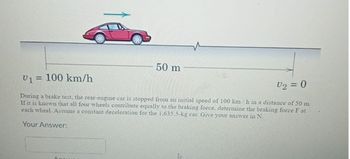
Managerial Economics: Applications, Strategies and Tactics (MindTap Course List)
14th Edition
ISBN: 9781305506381
Author: James R. McGuigan, R. Charles Moyer, Frederick H.deB. Harris
Publisher: Cengage Learning
expand_more
expand_more
format_list_bulleted
Question
do fast

Transcribed Image Text:50 m
V₁ = 100 km/h
V₁₂ = 0
During a brake test, the rear-engine car is stopped from an initial speed of 100 km/h in a distance of 50 m.
If it is known that all four wheels contribute equally to the braking force, determine the braking force F at
each wheel. Assume a constant deceleration for the 1.635.5-kg car. Give your answer in N.
Your Answer:
Expert Solution
This question has been solved!
Explore an expertly crafted, step-by-step solution for a thorough understanding of key concepts.
Step by stepSolved in 2 steps with 2 images

Knowledge Booster
Similar questions
- i need help with this question 8 from my microeconmics assigments. i have already gotten it wrong twice.arrow_forwardYou have been driving for about 3 hours early in the morning which of the following indicates that you might be fatarrow_forwardWhen you solve full question I will give Thumb up ?arrow_forward
arrow_back_ios
SEE MORE QUESTIONS
arrow_forward_ios
Recommended textbooks for you
 Managerial Economics: Applications, Strategies an...EconomicsISBN:9781305506381Author:James R. McGuigan, R. Charles Moyer, Frederick H.deB. HarrisPublisher:Cengage Learning
Managerial Economics: Applications, Strategies an...EconomicsISBN:9781305506381Author:James R. McGuigan, R. Charles Moyer, Frederick H.deB. HarrisPublisher:Cengage Learning

Managerial Economics: Applications, Strategies an...
Economics
ISBN:9781305506381
Author:James R. McGuigan, R. Charles Moyer, Frederick H.deB. Harris
Publisher:Cengage Learning